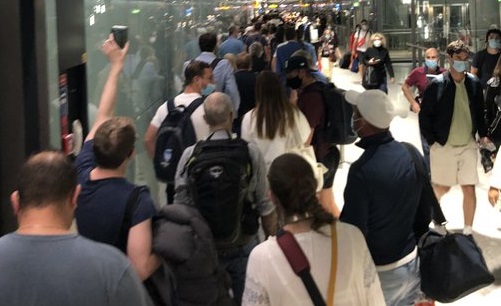Execs from TUI, EasyJet and British Airways grilled over role in Bank Holiday travel chaos

Airlines’ executives were grilled in Parliament over their role in the travel chaos, which has left thousands of Britons stranded over the half-term and Bank Holiday weekend.
Representatives from TUI, EasyJet and British Airways (BA) appeared before the Business, Energy and Industrial Strategy Committee (BEIS) today.
The committee questioned David Burling, TUI’s chief executive for markets and airlines, as well as EasyJet’s chief operating officer Sophie Deckers and BA’s chief corporate affairs director Lisa Tremble.
Labour MP Darren Jones, who chairs the committee, argued that BA and Easyjet were the most affected by cancellations because they sacked the most people among all the airlines.
During the pandemic, BA fired 10,000 workers while EasyJet’s redundancies amounted to 2,000.
“I just want to understand whether you as the representative of BA think you’re having the worst experience because you sacked the most staff using very aggressive tactics,” Jones asked Tremble. “Do you think that is true or not?”
Tremble, whose words were echoed by Burling and Deckers, said that while airlines accepted their faults, the travel chaos was due to an ecosystem of factors.
“We’ve all had very similar challenges and different approaches were taken by different companies at the time depending on the financial viability of running the operations,” Tremble explained.
“I think we are in a situation this year where a number of things aren’t working well, and they tend to multiply together,” added TUI’s David Burling.
“When one of them doesn’t work, it multiplies with another and then you end up with aircraft and crew in the wrong place.”
Aviation executives ascribed part of the blame to delays in giving staff security clearance, as it now takes 14 weeks to give crew ID passes, compared to the 10 weeks it took pre-Covid.
“The complexity is you need the last five years worth of referencing and as we know lots of people have taken multiple roles [over the last two years],” Sophie Deckers said.
Under the current system, airlines need to ask individual candidates to get their references from their previous employers, contributing to the creation of lengthy queues.
The industry has now asked the government for access to HMRC databases, which is expected to speed processes up as it will avoid employees going to their former employers for referencing.
“We have 3,000 people in the referencing process and we’re working through those numbers as quickly as we can but it’s taking us between 70 and 140 days to get people through that process, hence the delays,” added the BA executive.
Airlines also blamed staff shortages affecting contractors such as baggage and ground handlers as well as air traffic controllers.
Swissport’s managing director for the UK and Ireland Jude Winstanley said that despite recruiting 3,000 people since the start of the year, the situation remained difficult because of delays in ID checks.
While higher levels of sickness among staff, especially ground handlers, resulted in hundreds of cancelled flights, sometimes even on the day.
“Sometimes there are on-the-day problems that are outside of our control,” concluded Tremble. “We’re building more resilience into the system by taking capacity out but there are still some inevitable circumstances that happen on the day.
“This is a whole delicately tuned infrastructure.”
The parliamentary committee meeting took place on the same day 16,000 BA workers were consulted on strike action over pay and working conditions, City A.M. reported.